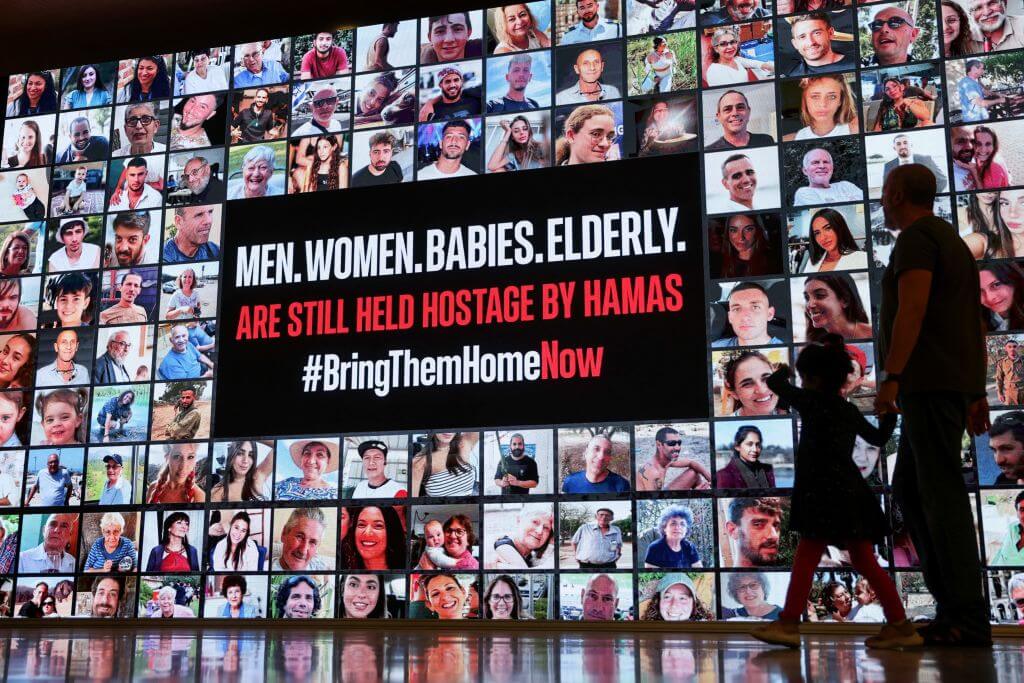Israel’s hostage deal makes the best of an impossible situation
In a conflict marked by moral absolutism, today’s hostage deal is a triumph of difficult compromise

A man and a child walk past portraits of Israeli hostages held in Gaza since the Oct. 7 attack by Hamas militants, in Tel Aviv on Nov. 21. Photo by Getty Images
In a conflict marked by moral absolutism, today’s hostage deal is a triumph of difficult compromise.
As the possibility of an agreement emerged, Israel’s leaders faced a dilemma: Israel could end the nightmare of at least some of the 240 hostages being held by Hamas, but only by negotiating with terrorists and freeing convicted criminals who may well harm Israelis in the future.
By all rights and laws of war, at least all of the civilian hostages (roughly half of those detained) should have been released immediately. Whatever war crimes Israel may be accused of, the war crimes Hamas committed on Oct. 7 are beyond dispute.
The hostage deal requires Israeli leaders to compromise on several core moral and political imperatives: Don’t negotiate with terrorists. Don’t settle for an imperfect agreement. Don’t give Hamas what it wants. And don’t allow violent criminals to go free.
But painful compromise is exactly what leaders have to do sometimes.
It’s easy for those of us on the sidelines (or on the political extremes, like Israel’s rejectionist hardliners) to chant slogans and state absolute truths. “Cease-fire now,” the left shouts. “Stop the slaughter.” “Destroy Hamas,” says the right. “Don’t give in.”
But reality is dictated by power and circumstance as much as by principle, and wisdom often bends principle toward mercy.
That was the choice that Israel’s war cabinet made today (apparently with significant U.S. intervention), choosing to save the lives of an estimated 50 people who have endured six weeks of living hell.
As a parent, the agony and trauma those kids’ families have experienced is absolutely incomprehensible. As much as there may be a moral imperative not to negotiate with terrorists, so too Judaism has its own moral imperative to rescue captives — pidyon shvuyim — which, in traditional Jewish law at least, trumps almost all other moral considerations.
Halachic rules don’t (and shouldn’t) dictate Israel’s political decisions. But the Jewish values behind them surely play a role.
It may be argued that Hamas has won this round. Thanks to its despicable acts of terrorism, and its callous use of thousands of Palestinians as human shields, it has won the release of 150 prisoners and a temporary reprieve from the fighting.
Their original acts of terror won them even more: The world’s attention has returned to the plight of the Palestinians, which Israel would prefer to be ignored. The subsequent war has turned many nations against Israel, igniting a new round of antisemitism around the world. And the scale of violence has made the cause of peace seem even more preposterous, which is exactly what Hamas and the Israeli right both want.
The war is not over, and Hamas’ leaders may yet lose their lives. But their murderous and barbaric rampage has paid off handsomely.
But Israel, too, can claim a partial victory.
Securing the release of hostages is a much-needed political win for Prime Minister Benjamin Netanyahu, of course. But it also represents at least some reprieve from the horrors of the past six weeks.
For a nation weary, tired, scared and traumatized, this is at least a sliver of good news. And of course, for the families of those taken captive, it is an unimaginable relief. Thank God for that.
It also is a strategic victory. Instead of giving into calls for an unconditional and unreciprocated cease-fire (which, while Hamas is holding civilians hostage, is hardly worthy of the name), Israel made the cease-fire part of the negotiations. Israel did not give away something for nothing. That too is a validation of its leaders’ stoicism and strategy.
In principle, it is horrible to turn innocent people into pawns of war. Humanitarian aid should not be a point of leverage. But this is the chess game, dictated by violence and power, that Hamas initiated on Oct. 7. When faced with an opponent like this, to choose only mercy is to ensure defeat.
So what happens next?
A brief, merciful pause in fighting provides no reason to think that either side has suddenly committed to nonviolence. Surely both Hamas and the Israeli military will use this “humanitarian” pause to regroup and rearm; I only hope the cease-fire holds long enough for all of the 50-or-so hostages to be released in the coming days, before one side or the other does something to restart the cycle of violence.
Still, in the meantime, even though most Israelis don’t celebrate Thanksgiving, there is finally some cause for giving thanks. The price was dear, and impossible to balance on some moral or strategic ledger. But that is not how the most difficult moral choices actually play out in our political or private lives. We face the circumstances before us, and make the best choice of the options available.
And then, whether we are believers or not, we can partner with God and say, in the words of one of Judaism’s daily blessings, Blessed are You, Source of life, who redeems the captives.
To contact the author, email [email protected].




















